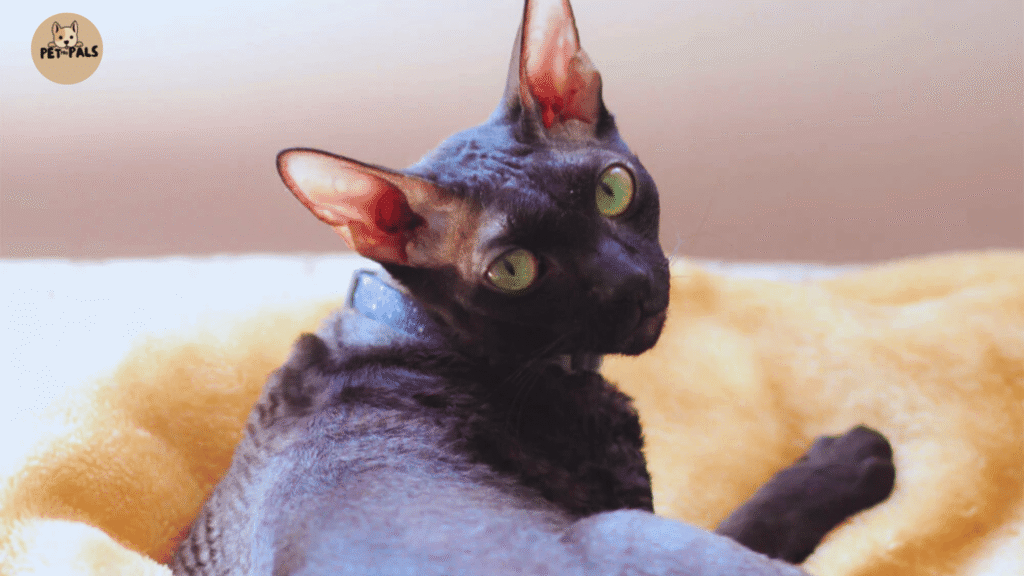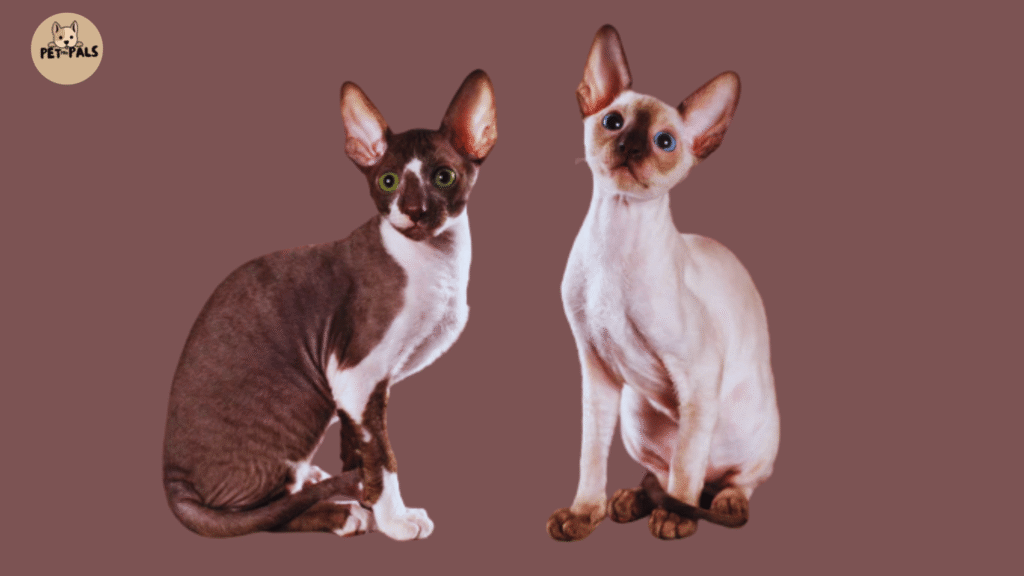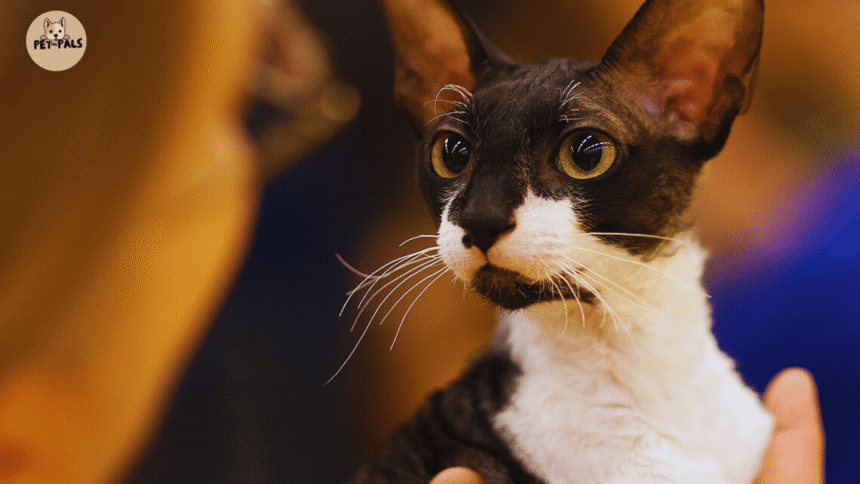Did you know the Cornish Rex cat doesn’t have a typical fur coat? Unlike most felines, this striking breed has no outer layer of fur, just a soft, curly undercoat that feels like crushed velvet. It’s one of the most touchably unique cats in the world.
Originating in Cornwall, England, in the 1950s, the Cornish Rex resulted from a natural genetic mutation. Its fine coat, large ears, and whippet-like body make it instantly recognizable, unlike any other domestic breed. But it’s not just about looks; this cat is full of energy, curiosity, and affection, often compared to a mischievous kitten well into adulthood.
In this complete guide, you’ll discover everything you need to know about the Cornish Rex cat: from its playful personality and care needs to its grooming tips, health considerations, and what to expect in terms of price and lifespan. Whether you’re considering adopting one or simply fascinated by rare breeds, this article will give you all the necessary insights.
Origins & History Of the Cornish Rex Cat

The Cornish Rex cat traces its roots back to Cornwall, England, in the early 1950s. The breed began with a natural genetic mutation when a barn cat gave birth to a litter that included one kitten with an unusually curly coat. This kitten, named Kallibunker, became the foundation of the Cornish Rex breed.
Recognizing the uniqueness of Kallibunker’s fine, wavy fur and slender build, breeders began selectively pairing him with related cats to preserve and enhance the curly-coat trait. Over time, this mutation was stabilized through careful breeding, giving rise to the elegant, soft-coated cat we know today.
Unlike most cats, the Cornish Rex lacks guard hairs and has only the downy undercoat, which creates its signature rippled fur. Its development was intentional, not accidental, aimed at creating a distinctively elegant and velvety breed with a playful spirit.
Cornish Rex Cat Price: What to Expect
The price of a Cornish Rex cat typically ranges from $800 to $1,500 in the United States. However, several factors can influence the cost:
| Category | Estimated Price |
|---|---|
| Pet-quality kitten | $800 – $1,200 |
| Show-quality kitten | $1,300 – $2,000+ |
| Retired breeder/adult | $300 – $700 |
| Adoption/rescue | $75 – $200 |
Factors That Affect Price:
- Breeder reputation & location
- Pedigree and show potential
- Color and rarity of coat/eyes
- Spay/neuter, microchip, and vaccinations included
Always buy from reputable breeders who screen for genetic health issues like hypertrophic cardiomyopathy (HCM). Alternatively, consider adopting a Cornish Rex from a breed-specific rescue; it’s more affordable and gives a cat a loving home.
Appearance & Physical Characteristics
The Cornish Rex cat is instantly recognizable for its elegant, almost alien-like appearance. It has a slender, fine-boned body that’s surprisingly muscular and agile, built more like a sprinter than a lap cat. One of its most unique features is its coat: short, soft, and tightly curled, the fur lacks guard hairs entirely. This gives the Cornish Rex a silky, suede-like texture that’s unlike any other breed.
Its egg-shaped head, high cheekbones, and Roman nose give it a refined look, while its oversized ears and expressive oval eyes add an endearing, quirky charm. Long legs and a whip-like tail complete its graceful and athletic frame.
Despite its delicate look, the Cornish Rex is highly active, agile, and loves to jump and climb.
Quick Breed Facts:
| Trait | Description |
|---|---|
| Weight | 6–10 lbs |
| Coat | Short, curly, lacks guard hairs |
| Eye Shape | Oval |
| Eye Colors | Gold, green, blue (varies with coat color) |
| Build | Fine-boned, slim but muscular |
| Head Shape | Egg-shaped with prominent features |
| Ears | Large and high-set |
| Tail | Long, thin, and tapering |
Temperament & Personality Of the Cornish Rex Cat
The Cornish Rex cat is a bundle of energy wrapped in velvet. Known for its clown-like behavior and playful antics, this breed stays kitten-like well into adulthood. Whether it’s leaping to the top of a bookshelf or chasing shadows on the wall, the Cornish Rex thrives on movement and stimulation.
But it’s not all chaos; this cat is also deeply affectionate and people-oriented. It craves attention and forms strong bonds with its family, often following them from room to room like a loyal companion. Don’t be surprised if it insists on sitting on your shoulder or cuddling under the covers at night.
Thanks to its social nature, the Cornish Rex usually gets along well with children, other cats, and even cat-friendly dogs. It’s highly intelligent, quick to learn routines, and may even figure out how to open doors or cabinets.
If you’re looking for a quiet lap cat, this breed may be too energetic. But for families who want an entertaining, loving, and interactive pet, the Cornish Rex is an ideal match.
Lifespan & Health

The Cornish Rex cat typically enjoys a long and healthy life, with an average lifespan of 12 to 15 years,some even live into their late teens with proper care. Despite their slim build and delicate appearance, they’re generally robust cats. However, like all breeds, they can be prone to certain health conditions.
Common Issues
Two of the most common concerns in Cornish Rex cats are hypertrophic cardiomyopathy (HCM),a form of heart disease, and patellar luxation, which affects the kneecap and can cause mobility issues. Responsible breeders screen for these issues, so adopting from a reputable source is key.
Regular Vet Checkups
These cats also benefit from regular veterinary checkups, as early detection of any problem can extend their quality of life. Good dental hygiene is essential, as dental disease is common in many cats and can affect overall health.
Because of their short, thin coat, Cornish Rex cats are more sensitive to temperature extremes. They should be kept indoors in a climate-controlled environment to avoid sunburn, chills, or injury.
With the right care, the Cornish Rex can lead a lively, affectionate, and healthy life for many years.
Grooming Needs For the Cornish Rex Cat
The Cornish Rex cat is a low-maintenance breed when it comes to grooming, but it does require some special attention due to its unique coat and sensitive skin. Unlike most cats, the Cornish Rex has no guard hairs, which means it doesn’t shed much. However, its soft, curly undercoat can still trap oils and debris.
A weekly gentle brushing with a soft-bristle or rubber grooming brush helps keep the coat clean and healthy without irritating the skin. Avoid using firm brushes or grooming too often, as their delicate coat can be easily damaged.
Because of its thin fur, the Cornish Rex is more susceptible to chilling and sunburn. Always keep your cat warm indoors and avoid exposing it to extreme temperatures. A cozy cat bed, warm blankets, or even pet clothing in winter can help protect this breed’s comfort and health.
Regular ear cleaning and nail trimming complete the grooming routine.
Feeding & Nutrition
The Cornish Rex cat has a fast metabolism and an active lifestyle, so a high-protein diet is essential to maintain its energy and lean muscle. Look for premium-quality cat food with real meat as the first ingredient, and avoid fillers like corn, soy, or by-products.
Due to its slim build and constant movement, the Cornish Rex may appear underweight even when healthy. However, it’s important to avoid overfeeding, as too many treats or free-feeding can lead to unwanted weight gain or digestive issues.
Split meals into two to three portions per day to help regulate energy levels and prevent overeating. Always provide access to fresh water, and consider consulting your vet to tailor a diet plan based on age, weight, and activity level.
This breed may also benefit from foods that support skin health, given its short coat and sensitivity.
Exercise & Enrichment
The Cornish Rex cat is one of the most energetic and playful cat breeds, and it thrives on daily physical and mental stimulation. Without enough activity, this curious feline can quickly become bored or mischievous.
To keep your Cornish Rex happy and healthy, engage in daily interactive play sessions using feather wands, laser pointers, or bouncing balls. This breed loves to jump and climb, so cat trees, shelves, and vertical spaces are ideal additions to your home.
In addition to physical activity, puzzle feeders and treat-dispensing toys help satisfy its sharp mind. These cats are intelligent and love a challenge, so rotating toys or introducing new ones regularly can prevent boredom.
Left alone without stimulation, the Cornish Rex might find its own “fun,” which can sometimes mean trouble! A stimulating environment is key to keeping this playful companion content.
Environment & Living Needs For Cornish Rex Cat
The Cornish Rex cat is best suited for an indoor lifestyle due to its fragile, thin coat, which offers little protection against cold, sunburn, or injury. It thrives in a warm, climate-controlled home and will often seek out cozy spots like sunny windowsills, heaters, or under blankets.
Make sure to provide warm bedding or cat caves throughout your home. Despite its elegance, this breed is extremely active and playful, so even in an apartment setting, it needs vertical space and engaging toys. A safe, enriched indoor environment will keep your Cornish Rex healthy, happy, and out of trouble.
Cornish Rex vs Other Breeds
Here’s a comparison table to help you understand how the Cornish Rex stacks up against two similar breeds:
| Feature | Cornish Rex | Devon Rex | Siamese |
|---|---|---|---|
| Coat Type | Curly, soft | Wavy, short | Sleek, short |
| Energy Level | Very high | High | High |
| Friendliness | Extremely social | Affectionate | Social, vocal |
| Grooming Need | Low | Low | Low |
| Common Health | Heart, knee issues | Skin sensitivity | Respiratory issues |
Conclusion
With its curly coat, oversized ears, and endless energy, the Cornish Rex cat is a true standout in the feline world. It combines a one-of-a-kind appearance with a deeply affectionate, intelligent, and playful personality. Despite its high energy, the breed is relatively low-maintenance in grooming and thrives in a loving, indoor environment.
The Cornish Rex is best suited for active households, families with children, or experienced cat owners who can meet its needs for attention, play, and warmth.
Have you ever owned or met a Cornish Rex? We’d love to hear your experience! Drop a comment below or connect with fellow cat lovers.
FAQs About the Cornish Rex Cat
Are Cornish Rex cats hypoallergenic?
While no cat is truly hypoallergenic, Cornish Rex cats may trigger fewer allergies due to their short, fine coat and reduced shedding.
Do Cornish Rex cats shed?
Yes, but very minimally. They have only a soft undercoat and lack the typical shedding guard hairs of most cats.
Are Cornish Rex cats good with children?
Absolutely! They are playful, affectionate, and gentle, making them great companions for respectful children.
How much does a Cornish Rex cat cost?
Expect to pay between $800 to $1,500 from a reputable breeder. Show-quality kittens may cost more.
What are common Cornish Rex health problems?
Due to their thin coat, they are sensitive to temperature extremes. Indoor living with climate control is ideal.
Can Cornish Rex cats live in hot or cold climates?
Due to their thin coat, they are sensitive to temperature extremes. Indoor living with climate control is ideal.
Do Cornish Rex cats need a companion pet?
They are very social and often do well with another cat or a friendly dog to avoid loneliness.
How to bathe a Cornish Rex cat?
Use a gentle, hypoallergenic pet shampoo. Bathe only as needed—typically every few months to remove skin oils.
Are Cornish Rex cats vocal?
They are not as vocal as Siamese cats but can be chatty and expressive, especially when seeking attention.
How long do Cornish Rex cats live?
With proper care, they typically live 12–15 years, and sometimes even longer.

